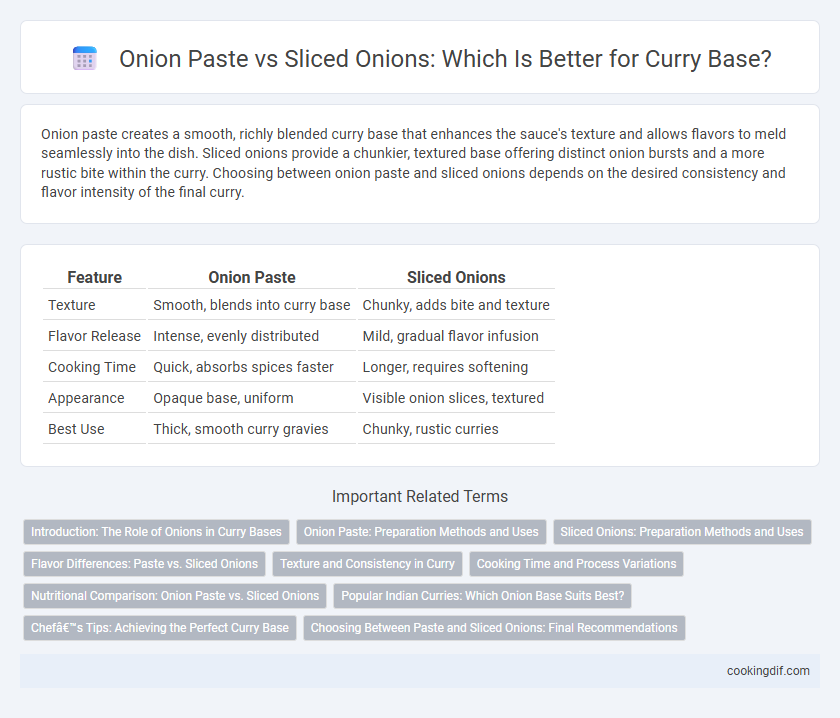Onion paste creates a smooth, richly blended curry base that enhances the sauce's texture and allows flavors to meld seamlessly into the dish. Sliced onions provide a chunkier, textured base offering distinct onion bursts and a more rustic bite within the curry. Choosing between onion paste and sliced onions depends on the desired consistency and flavor intensity of the final curry.
Table of Comparison
| Feature | Onion Paste | Sliced Onions |
|---|---|---|
| Texture | Smooth, blends into curry base | Chunky, adds bite and texture |
| Flavor Release | Intense, evenly distributed | Mild, gradual flavor infusion |
| Cooking Time | Quick, absorbs spices faster | Longer, requires softening |
| Appearance | Opaque base, uniform | Visible onion slices, textured |
| Best Use | Thick, smooth curry gravies | Chunky, rustic curries |
Introduction: The Role of Onions in Curry Bases
Onions serve as a fundamental ingredient in curry bases, contributing both flavor and texture essential to authentic recipes. Using onion paste allows for a smoother, more consistent blend that thickens the curry and integrates seamlessly with spices. Sliced onions provide distinct, layered bites and caramelize differently, affecting the overall depth and mouthfeel of the curry.
Onion Paste: Preparation Methods and Uses
Onion paste for curry base is prepared by finely grinding onions to create a smooth, concentrated texture that enhances the curry's flavor and promotes even cooking. This method releases natural sugars and intensifies the sweetness, leading to a richer and thicker sauce compared to sliced onions. Onion paste is commonly used in Indian and South Asian curries, allowing it to blend seamlessly with spices and form a creamy foundation for the dish.
Sliced Onions: Preparation Methods and Uses
Sliced onions for curry base offer distinct layers and texture, essential for developing depth in stews and sauces. Preparing them involves uniform slicing to ensure even caramelization, which intensifies the natural sweetness and enhances umami flavors. Their versatility suits sauteing, slow cooking, or tempering, making sliced onions a fundamental ingredient in crafting rich, aromatic curry bases.
Flavor Differences: Paste vs. Sliced Onions
Onion paste in curry bases provides a smooth, rich texture that blends seamlessly, intensifying the overall flavor with a slightly caramelized sweetness from slow cooking. Sliced onions retain a firmer texture and deliver bursts of sharpness and distinct layers of flavor as they soften unevenly during cooking. Using paste results in a more homogeneous, creamy sauce, while sliced onions contribute varied mouthfeel and a more pronounced onion profile in each bite.
Texture and Consistency in Curry
Onion paste creates a smoother, creamier texture in curry, blending seamlessly into the sauce for a rich consistency. Sliced onions provide a more distinct, chunky texture that adds bite and variation throughout the curry. The choice between paste and slices directly influences the curry's mouthfeel, with paste yielding a velvety base and slices offering a rustic, hearty contrast.
Cooking Time and Process Variations
Onion paste in curry base cooks faster due to its fine texture, allowing it to caramelize quickly and blend seamlessly, reducing overall cooking time by up to 30%. Sliced onions require longer sauteing to soften and develop sweetness, often needing 10-15 minutes compared to 5-7 minutes for paste. The paste creates a smoother sauce, while sliced onions add texture and complexity through gradual softening during cooking.
Nutritional Comparison: Onion Paste vs. Sliced Onions
Onion paste offers a more concentrated source of nutrients like vitamins C and B6 compared to sliced onions, as its processing breaks down cell walls, enhancing bioavailability. While sliced onions retain more fiber, which supports digestion, onion paste delivers higher amounts of antioxidants such as quercetin and sulfur compounds crucial for immune health. Choosing between the two depends on balancing nutrient density and dietary fiber needs within the curry base.
Popular Indian Curries: Which Onion Base Suits Best?
Onion paste creates a rich, creamy texture ideal for butter chicken and paneer makhani, enhancing the thick curry base with smooth consistency and deep flavor. Sliced onions maintain a slight crunch and offer a caramelized sweetness favored in dishes like masala dosa and sambar, adding layers of texture and subtle sharpness. Choosing between onion paste and sliced onions depends on the desired curry style; paste suits creamier, tomato-based gravies, while sliced onions excel in rustic, South Indian curry preparations.
Chef’s Tips: Achieving the Perfect Curry Base
Onion paste creates a smoother, thicker curry base that enhances the richness and allows spices to blend seamlessly, while sliced onions provide texture and a slightly caramelized flavor during cooking. Chefs recommend gently sauteing onions until golden for a balanced flavor, but using onion paste saves time and produces a more uniform sauce. For an ideal curry base, combining both can offer depth and consistency, ensuring a flavorful foundation.
Choosing Between Paste and Sliced Onions: Final Recommendations
Onion paste creates a smooth, creamy curry base by fully integrating into the sauce, while sliced onions add texture and distinct bursts of flavor. For rich, velvety curries like butter chicken or korma, onion paste enhances depth and consistency, whereas sliced onions suit dishes where a layered, slightly crunchy bite is desired. Choose based on desired texture and cooking time: paste for long-simmered sauces, sliced for quicker, more textured curries.
Onion paste vs Sliced onions for curry base Infographic

 cookingdif.com
cookingdif.com